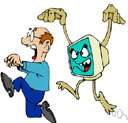un·so·cia·ble
(ŭn-sō′shə-bəl)adj.
1. Not disposed to seek the company of others; not sociable.
2. Not conducive to social exchange: an unsociable atmosphere.
un·so′cia·bil′i·ty, un·so′cia·ble·ness n.
un·so′cia·bly adv.
American Heritage® Dictionary of the English Language, Fifth Edition. Copyright © 2016 by Houghton Mifflin Harcourt Publishing Company. Published by Houghton Mifflin Harcourt Publishing Company. All rights reserved.
Sociability/Unsociability
See Also: BEHAVIOR
- Antisocial as death —Mary McCarthy
- (About as) chummy as a pair of panthers —James Forbes
- Flung himself upon Arthur like a young bear —Christopher Isherwood
- Friendly as a letter from home —Slogan, wine advisory board
- (He insisted on being) friendly, like a man running for sheriff —Jay Parini
- Greeted me like the morning sun that had deserted the skies —Mike Fredman
- The greeting I received (from Phoebe) was as damp as the weather outside —Mike Fredman
- He was never alone. He wore other people like armour —William McIlvanney
- (The knocking was) hostile as a kick in the balls —Harold Adams
Similes can provide attention-getting openings for a story, as this one did for Adams’ mystery novel, The Fourth Widow.
- Pleasant as a smile —Anon
- Snarled like a racoon (whenever she was pushed) —Miles Gibson
- Unresponsive as a bag of wet laundry —David Leavitt
- Affable as a wet dog —Alfred Henry Lewis
Similes Dictionary, 1st Edition. © 1988 The Gale Group, Inc. All rights reserved.
ThesaurusAntonymsRelated WordsSynonymsLegend:
| Noun | 1. |  unsociability - an unsociable disposition; avoiding friendship or companionship unsociability - an unsociable disposition; avoiding friendship or companionshipintroversion - (psychology) an introverted disposition; concern with one's own thoughts and feelings disposition, temperament - your usual mood; "he has a happy disposition" standoffishness, withdrawnness, aloofness, remoteness - a disposition to be distant and unsympathetic in manner secretiveness, closeness - characterized by a lack of openness (especially about one's actions or purposes) sociability, sociableness - the relative tendency or disposition to be sociable or associate with one's fellows |
Based on WordNet 3.0, Farlex clipart collection. © 2003-2012 Princeton University, Farlex Inc.
Translations
Collins Spanish Dictionary - Complete and Unabridged 8th Edition 2005 © William Collins Sons & Co. Ltd. 1971, 1988 © HarperCollins Publishers 1992, 1993, 1996, 1997, 2000, 2003, 2005
unsociability
n → Ungeselligkeit f
Collins German Dictionary – Complete and Unabridged 7th Edition 2005. © William Collins Sons & Co. Ltd. 1980 © HarperCollins Publishers 1991, 1997, 1999, 2004, 2005, 2007